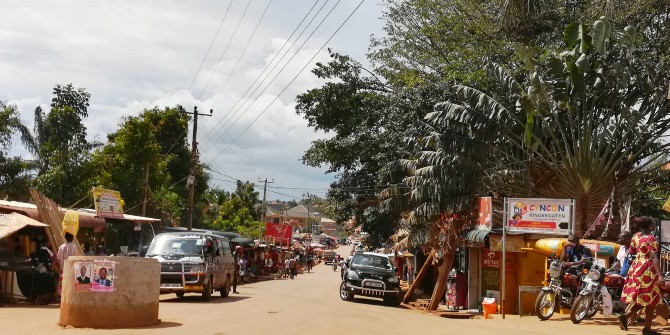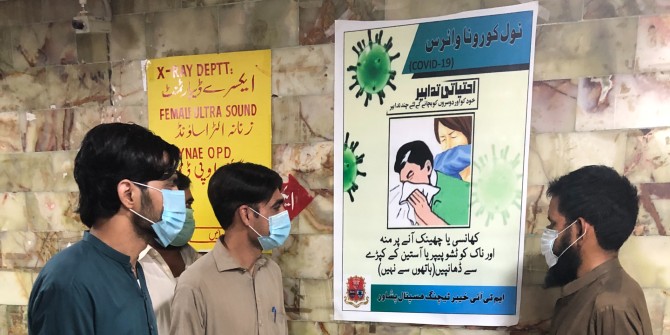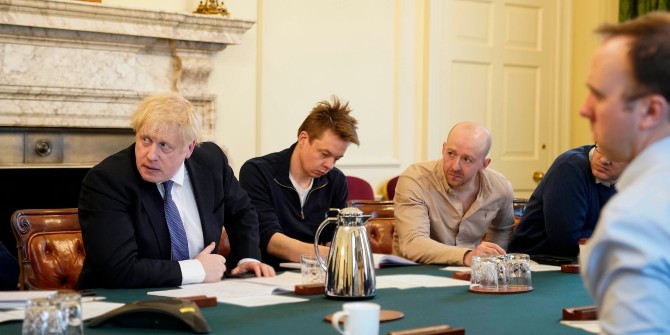Uganda will hold elections in 2021, and face masks have become a political statement. Innocent Anguyo explains how the government has distributed masks in its own colour of yellow, while opposition parties use them as a symbol of resistance.
Right from the infancy of COVID-19 in Uganda, President Yoweri Museveni heeded the recommendation of health experts, and made the wearing of face masks in public mandatory. Prior to registering the first case of the virus, Ugandan authorities responded proactively, rolling out a public health campaign and instituting stringent lockdown measures – actions that have helped slow the growth of confirmed new infections.

Politically, there has been multi-partisan backing for most of the edicts aimed at stemming the spread of the virus, but partisan differences are now emerging. Politicians and political parties are distributing face masks customised with their colours and symbols. As was the case with the distribution of food relief, commentators have argued that political actors are instrumentalising face masks for political profit.
Political dressing?
The government issued guidelines for the design and materials of masks, but placed no restrictions on their colour and symbolism. With elections fast approaching and public rallies banned for the foreseeable future, political actors are using this opportunity to distribute masks with their colours and symbols. This is being done by many politicians running in the forthcoming elections, as well as all the major political parties.
The government appears to have recognised the significance of face masks for politicking. Sourcing 35 million masks to distribute to Ugandans aged over six, as part of state-sponsored relief efforts, the State Minister for Investment Evelyn Anite warned that they would shun those with ‘political party colours like yellow, red, blue… [and] … symbols as Government will only buy masks that aren’t politically branded…’ Yellow is the colour of the ruling National Resistance Movement (NRM); blue is of the Forum for Democratic Change (FDC); and red is increasingly associated with People Power, a political movement founded and led by musician turned opposition politician Robert Kyagulanyi, alias Bobi Wine.
But Anite’s statement seemed to become the official government position when Judith Nabakooba, the cabinet spokesperson and Minister for ICT and National Guidance, confirmed that public-funded masks would have non-partisan colours. Although commentators had their reservations, the government initially gave Ugandans the benefit of the doubt. The first batch of relief face masks had grey, white, black and other non-partisan colours.
However, it did not take long for the government to make a discreet U-turn and tap into the potential of masks for political dressing. Subsequent consignments increasingly contain yellow face masks, and none in the colour of opposition parties. Ministers also lead distribution efforts. Many now ask whether the NRM is using a public health platform and state resources to enhance its political capital, as they did with relief food. Relief mask distribution will cost the taxpayer Shs 81 billion (about $22 million), a significant increment from the initial budget of Shs 35 billion (approximately $9 million). By the end of June, six million masks had been distributed in 22 border districts.
Government distribution of yellow masks has drawn mixed reactions from the public. Some, like Simon Kaggwa Njala, a prominent morning show host on NBS Television, oppose the move:
‘Enduring the pain of Covid-19 lockdown is stressful enough. Asking us to wear yellow masks is double tragedy. To that effect, I beg to defy. I’ll wear any other mask. No yellow on my mouth. No! Hell NO!’
Others, like Andrew Nsubuga, believe there is nothing unusual about it:
‘Y’all incoherently ranting over the yellow Gov’t masks! Like you do not know wat forms a gov’t is a party that won Elections. Whether or not you like them the NRM is the party in government.’
It is not uncommon for the government to attempt to monopolise space for politicking, particularly political dressing. The government earlier banned the civilian wearing of red berets, which are associated with Bobi Wine, who has declared his intention to run for president in 2021 with his People Power movement. ‘The beret, it’s our symbol. When we wear those berets we identify not just with People Power but with the cause for a better Uganda,’ People Power spokesperson Joel Senyonyi told Reuters. Wine and his supporters have also been sporting other red outfits such as overalls, shirts and sweaters. For Wine and his supporters the beret has come to be a ‘symbol of resistance’. But the beret (without the People Power emblem), which also forms part of a military outfit for a section of the army, has now been included in a gazette of military clothing for which possession means citizens are ‘liable on conviction to imprisonment for a term not exceeding five years’.
Research shows that political colours and associated emblems play a vital role as visual symbols of political struggle. A study by Susan Sawer of the Australian National University published in 2007, for instance, finds that ‘political colours help to create and sustain collective identities and illustrate the role of affect in political life’. But colours and emblems, she argues, not only facilitate visual association with ‘the cause’ as well as ‘the outward display of values’, but equally perform a vital function in ‘sustaining a sense of community’.
Wearing masks as a political statement
Many Ugandans have embraced the president’s order to wear face masks in public. For many, wearing a mask is a political statement and a medium for self-expression – an opportunity to choose sides in a fast-brewing election fight. Given the entanglement of political allegiance and mask production, wearing a particular coloured mask is read by many Ugandans as a statement of solidarity – revealing that the wearer shares the concerns of a political actor, their values and ideologies, and endorses their manifesto. Some of them are personalised with the faces of candidates running for elective office. Face mask distribution by leading actors offers a glimpse of the entanglements of the COVID-19 response and politics.
Prominent Ugandan columnist Charles Onyango-obbo opines that, in political dressing, ‘Bobi Wine and his #PeoplePower have probably mastered that better than other political actors’. However, People Power and opposition parties appear to be simply trying to find innovative ways to politically mobilise and catch up with the NRM, whose leaders continue to defy mandatory social distancing to campaign. Unlike opposition politicians, NRM leaders rarely endure arrest and harassment by the security forces. The NRM seems to be flexing its financial muscle by ramping up the distribution of its yellow masks across the country. Taking their cue from NRM leaders, many Ugandans are now acquiring and wearing the yellow face masks as a precaution against harassment by the security forces.
Some Ugandans also expect rewards from wearing masks. They then become a means to an end, a coping mechanism. For example, Martin Kakooza, an unemployed resident of Katanga slum in Kampala who calls himself a ‘political analyst’, says he has three masks – for FDC, NRM and People Power – which he alternates depending on
‘where the money is coming from at a particular point in time … Today you wear NRM to get money from them, tomorrow you wear People Power to get sugar from there. Hahaha…that is how you survive in Kampala.’
Other residents in Kampala make a defiant statement by wearing the face mask of a political actor other than the predominant/ruling one. Considering the brutality with which Ugandan security forces enforce the president’s orders, sporting the masks of opposition figures can be a means of challenging the regime. Yet it may be risky: the Local Defence Units (LDUs), who carry arms despite being less trained than soldiers and police officers, have killed a number of people during the lockdown. Although COVID-19 has claimed two lives in Uganda, security forces have killed at least seven people since the lockdown began in March 2020.
Politicising public health
Instrumentalising face masks for political ends does not necessarily conflict with public health. In fact, political face masks enable political actors to achieve their campaign goals while making it more difficult for those infected with the virus to pass it on to members of the public.
Yet as political masks in Uganda are principally made from cloth, which makes them less efficacious than surgical and N-95 masks, their proliferation could ruin efforts to combat the spread of the virus. Additionally, most of the relief masks the government distributes are generic ‘one size fits all’, triggering potential problems with fit and the leakage of virus-laden particles. A recent study published by the American Chemical Society revealed that fitting cloth masks improperly could leave gaps between the face and the mask, leading to filtration inefficiency of more than 60%. Another study in the British Medical Journal found that users of cloth masks could be vulnerable to heightened risk of infection due to reuse, moisture retention and poor filtration. The same study discovered that medical masks were 53 percentage points more effective than cloth masks in keeping particles at bay. Prioritising distribution of face masks and mandating their use in public therefore gives users false confidence that they are protected against the virus, as testified by the large crowds gathering during the nomination of election candidates.
The government ought to prioritise public health campaigns aiming to achieve optimal and mandatory use of face masks, but they should not be (covertly) promoted as the sole priority. Other preventive approaches such as social distancing, hand washing, avoiding face touching and regular sanitisation of commonly used surfaces should be promoted too. Elections could mean the end of the instrumentalisation of face masks as political dressing, but escalation of the virus could lead to widespread political upheaval.
This post represents the views of the author and not those of the COVID-19 blog, nor LSE. It first appeared at the Africa at LSE blog in a slightly different form and is part of the series Shifting Spaces, an emerging timeline of COVID-19 responses from Kenya, Malawi, Tanzania and Uganda from the LEAD research project at the Firoz Lalji Centre for Africa.





